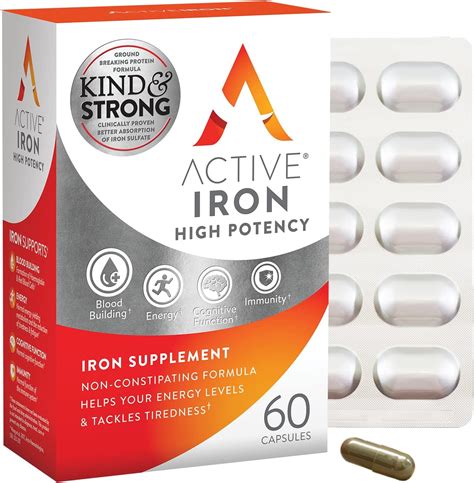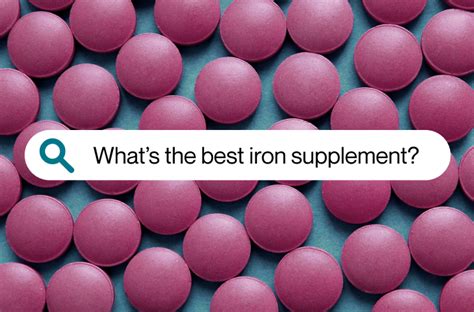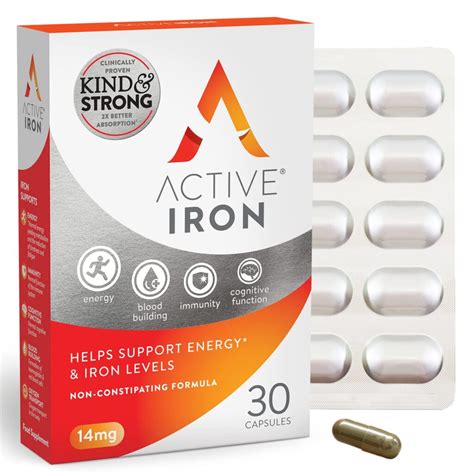Iron is an essential nutrient that plays a critical role in many bodily functions, including the production of red blood cells, which carry oxygen throughout the body. Despite its importance, many people do not get enough iron from their diet, leading to iron deficiency and related health issues. Iron supplements can help bridge this nutritional gap, but it's crucial to understand their benefits, how they work, and how to choose the right one. In this article, we will delve into the world of iron supplements, exploring their advantages, mechanisms, and practical considerations.
Iron deficiency is a common condition that can lead to anemia, a disorder characterized by a decrease in the number of red blood cells or the amount of hemoglobin in the blood. Hemoglobin is a protein in red blood cells that enables them to carry oxygen around the body. Without enough iron, the body cannot produce enough healthy oxygen-carrying red blood cells. Iron supplements are often prescribed to individuals with iron deficiency anemia, but they can also be beneficial for people who are at risk of developing iron deficiency, such as pregnant women, individuals with certain chronic diseases, and those who follow a vegetarian or vegan diet.
The human body is incredibly efficient at recycling iron from old red blood cells, but it cannot produce new iron on its own. Therefore, iron must be obtained through the diet or supplements. There are two forms of dietary iron: heme iron, which is found in animal products like meat, fish, and poultry, and non-heme iron, which is found in plant-based foods like beans, lentils, and fortified cereals. Iron supplements typically contain non-heme iron, as it is more easily produced and less expensive than heme iron. However, both forms of iron are essential for maintaining good health, and supplements can help ensure that the body gets the iron it needs.
Benefits of Iron Supplements

Iron supplements offer several benefits, particularly for individuals who are at risk of iron deficiency or have been diagnosed with iron deficiency anemia. Some of the key advantages of taking iron supplements include:
* Improved red blood cell production: Iron is essential for the production of hemoglobin, which enables red blood cells to carry oxygen throughout the body.
* Increased energy levels: Iron deficiency can lead to fatigue, weakness, and shortness of breath. Taking iron supplements can help alleviate these symptoms by ensuring that the body has enough iron to produce healthy red blood cells.
* Enhanced cognitive function: Iron plays a critical role in brain function and development. Iron supplements may help improve cognitive performance, particularly in individuals with iron deficiency.
* Better athletic performance: Iron is essential for the production of myoglobin, a protein that stores oxygen in muscles. This makes it easier for the body to transport oxygen to the muscles during exercise, which can improve athletic performance.
* Reduced risk of iron deficiency anemia: Iron supplements can help prevent iron deficiency anemia, particularly in individuals who are at risk of developing the condition.
How Iron Supplements Work
Iron supplements work by providing the body with the iron it needs to produce healthy red blood cells. When taken as directed, iron supplements can help increase iron levels in the body, which can lead to improved red blood cell production, increased energy levels, and enhanced cognitive function. There are several types of iron supplements available, including ferrous sulfate, ferrous gluconate, and ferric citrate. Each type of supplement has its own advantages and disadvantages, and some may be better suited to certain individuals than others.
Types of Iron Supplements

There are several types of iron supplements available, each with its own advantages and disadvantages. Some of the most common types of iron supplements include:
1. Ferrous sulfate: This is one of the most commonly prescribed iron supplements. It is inexpensive and effective, but it can cause gastrointestinal side effects like nausea, vomiting, and diarrhea.
2. Ferrous gluconate: This type of iron supplement is less likely to cause gastrointestinal side effects than ferrous sulfate, but it may not be as effective.
3. Ferric citrate: This type of iron supplement is often used to treat iron deficiency anemia in individuals with chronic kidney disease. It is less likely to cause gastrointestinal side effects than ferrous sulfate, but it may be more expensive.
4. Iron amino acid chelate: This type of iron supplement is made by binding iron to an amino acid, which can make it easier to absorb. It is often used to treat iron deficiency anemia in individuals who have trouble absorbing iron from other sources.
Choosing the Right Iron Supplement

Choosing the right iron supplement can be overwhelming, particularly for individuals who are new to taking supplements. Here are some factors to consider when selecting an iron supplement:
* Type of iron: There are several types of iron supplements available, including ferrous sulfate, ferrous gluconate, and ferric citrate. Each type of supplement has its own advantages and disadvantages, and some may be better suited to certain individuals than others.
* Dose: The dose of iron in a supplement can vary widely, ranging from 18 mg to 65 mg per serving. It's essential to choose a supplement that contains the right amount of iron for your needs.
* Absorbability: Some iron supplements are more easily absorbed by the body than others. Look for supplements that contain iron in a form that is easily absorbed, such as iron amino acid chelate.
* Side effects: Iron supplements can cause gastrointestinal side effects like nausea, vomiting, and diarrhea. Look for supplements that are less likely to cause these side effects, such as ferrous gluconate or ferric citrate.
Practical Considerations
Here are some practical considerations to keep in mind when taking iron supplements:
* Take iron supplements with food: Iron supplements can cause gastrointestinal side effects like nausea, vomiting, and diarrhea. Taking them with food can help minimize these side effects.
* Avoid taking iron supplements with milk or calcium: Milk and calcium can inhibit the absorption of iron, making it less effective. Avoid taking iron supplements with milk or calcium-containing foods.
* Take iron supplements at the same time every day: Consistency is key when it comes to taking iron supplements. Take them at the same time every day to help your body get into a routine.
* Monitor your iron levels: It's essential to monitor your iron levels regularly to ensure that you're getting enough iron from your supplements. Your healthcare provider can help you determine the best way to monitor your iron levels.
Conclusion and Next Steps
In conclusion, iron supplements can be a valuable tool for individuals who are at risk of iron deficiency or have been diagnosed with iron deficiency anemia. By understanding the benefits, mechanisms, and practical considerations of iron supplements, individuals can make informed decisions about their health. If you're considering taking iron supplements, talk to your healthcare provider to determine the best course of action for your specific needs. With the right supplement and a little patience, you can help ensure that your body gets the iron it needs to function properly.
We invite you to share your thoughts and experiences with iron supplements in the comments below. Have you taken iron supplements in the past? What benefits or side effects did you experience? Your feedback can help others make informed decisions about their health. Additionally, if you found this article helpful, please share it with your friends and family on social media. Together, we can help spread awareness about the importance of iron supplements and promote better health for everyone.
What are the benefits of taking iron supplements?
+
The benefits of taking iron supplements include improved red blood cell production, increased energy levels, enhanced cognitive function, better athletic performance, and reduced risk of iron deficiency anemia.
How do iron supplements work?
+
Iron supplements work by providing the body with the iron it needs to produce healthy red blood cells. When taken as directed, iron supplements can help increase iron levels in the body, leading to improved red blood cell production, increased energy levels, and enhanced cognitive function.
What are the different types of iron supplements available?
+
There are several types of iron supplements available, including ferrous sulfate, ferrous gluconate, ferric citrate, and iron amino acid chelate. Each type of supplement has its own advantages and disadvantages, and some may be better suited to certain individuals than others.
How do I choose the right iron supplement for my needs?
+
Choosing the right iron supplement involves considering several factors, including the type of iron, dose, absorbability, and side effects. It's essential to talk to your healthcare provider to determine the best course of action for your specific needs.
What are some practical considerations to keep in mind when taking iron supplements?
+
Practical considerations to keep in mind when taking iron supplements include taking them with food, avoiding milk or calcium, taking them at the same time every day, and monitoring your iron levels regularly.






